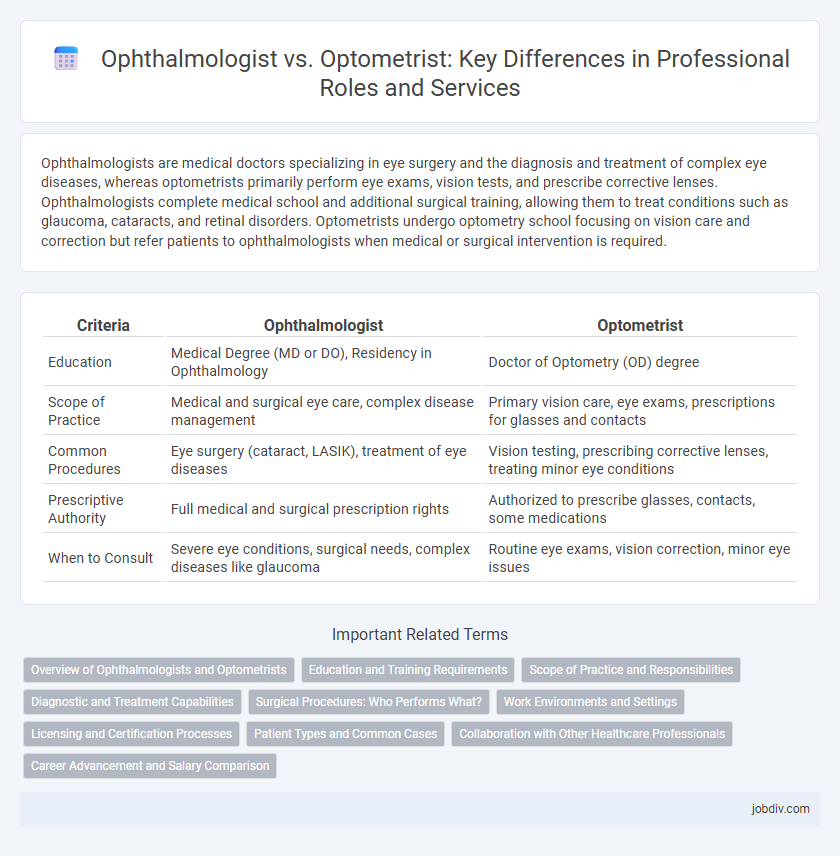Ophthalmologists are medical doctors specializing in eye surgery and the diagnosis and treatment of complex eye diseases, whereas optometrists primarily perform eye exams, vision tests, and prescribe corrective lenses. Ophthalmologists complete medical school and additional surgical training, allowing them to treat conditions such as glaucoma, cataracts, and retinal disorders. Optometrists undergo optometry school focusing on vision care and correction but refer patients to ophthalmologists when medical or surgical intervention is required.
Table of Comparison
| Criteria | Ophthalmologist | Optometrist |
|---|---|---|
| Education | Medical Degree (MD or DO), Residency in Ophthalmology | Doctor of Optometry (OD) degree |
| Scope of Practice | Medical and surgical eye care, complex disease management | Primary vision care, eye exams, prescriptions for glasses and contacts |
| Common Procedures | Eye surgery (cataract, LASIK), treatment of eye diseases | Vision testing, prescribing corrective lenses, treating minor eye conditions |
| Prescriptive Authority | Full medical and surgical prescription rights | Authorized to prescribe glasses, contacts, some medications |
| When to Consult | Severe eye conditions, surgical needs, complex diseases like glaucoma | Routine eye exams, vision correction, minor eye issues |
Overview of Ophthalmologists and Optometrists
Ophthalmologists are medical doctors specialized in eye and vision care, capable of performing surgeries and treating complex eye diseases, whereas optometrists primarily provide vision tests, prescribe corrective lenses, and diagnose common eye conditions. Ophthalmologists complete medical school and extensive postgraduate training in medical and surgical eye care, while optometrists undergo optometry-specific education focusing on vision correction and basic eye health assessments. Both professionals play crucial roles in eye health, but ophthalmologists handle more advanced medical and surgical interventions.
Education and Training Requirements
Ophthalmologists complete a medical degree followed by a residency in ophthalmology, encompassing extensive surgical training and medical management of eye diseases. Optometrists earn a Doctor of Optometry (O.D.) degree after undergraduate studies, focusing on vision care, eye exams, and prescribing corrective lenses without surgical training. The rigorous medical and surgical education of ophthalmologists differentiates their scope of practice from optometrists, who primarily provide primary eye care and vision correction.
Scope of Practice and Responsibilities
An ophthalmologist is a medical doctor specializing in comprehensive eye care, including diagnosing and treating complex eye diseases, performing surgeries such as cataract removal, and managing chronic conditions like glaucoma. Optometrists primarily provide vision care through eye exams, prescribing corrective lenses, and detecting common eye disorders, but they do not perform surgery. Both professionals play critical roles in eye health, with ophthalmologists focusing on medical and surgical treatment while optometrists emphasize vision correction and preventive care.
Diagnostic and Treatment Capabilities
Ophthalmologists are medical doctors specializing in comprehensive eye care, including advanced diagnostic procedures, surgical interventions, and treatment of complex eye diseases such as glaucoma, cataracts, and retinal disorders. Optometrists primarily conduct eye exams, vision tests, and prescribe corrective lenses while managing common eye conditions like dry eye and minor infections but typically do not perform surgery. The distinction in diagnostic and treatment capabilities highlights ophthalmologists' role in addressing severe ocular health issues requiring medical or surgical expertise.
Surgical Procedures: Who Performs What?
Ophthalmologists are medical doctors specialized in eye surgery, performing complex procedures such as cataract removal, LASIK, retinal detachment repair, and corneal transplants. Optometrists primarily conduct eye exams, vision tests, and prescribe corrective lenses, but do not perform surgical operations. For surgical intervention, patients must consult an ophthalmologist to ensure expert care and advanced treatment options.
Work Environments and Settings
Ophthalmologists primarily work in hospitals, surgical centers, and specialized eye clinics where they perform complex surgeries and manage severe eye diseases. Optometrists are commonly found in retail optical stores, private practices, and community health centers focusing on routine eye exams, vision correction, and preventive care. Both professionals collaborate within multidisciplinary healthcare environments to ensure comprehensive ocular health management.
Licensing and Certification Processes
Ophthalmologists complete medical school followed by a residency in ophthalmology, obtaining a medical license and board certification from the American Board of Ophthalmology. Optometrists earn a Doctor of Optometry (OD) degree through a four-year accredited optometry program, then pass the National Board of Examiners in Optometry (NBEO) exam and obtain state licensure. Both professionals must fulfill continuing education requirements to maintain their certification and licenses for legal practice.
Patient Types and Common Cases
Ophthalmologists often treat patients with complex eye diseases such as glaucoma, diabetic retinopathy, and those requiring surgical intervention, while optometrists typically manage routine eye exams, vision correction, and common conditions like dry eye or refractive errors. Patients with chronic or severe eye conditions are more likely to seek care from ophthalmologists, who hold medical degrees and are trained to perform surgeries. Optometrists provide primary vision care and are essential for early detection of issues, referring patients to ophthalmologists when advanced treatment is necessary.
Collaboration with Other Healthcare Professionals
Ophthalmologists and optometrists collaborate closely with primary care physicians, neurologists, and endocrinologists to ensure comprehensive patient care. This interdisciplinary approach enhances diagnosis accuracy and treatment efficacy for complex ocular conditions such as diabetic retinopathy and glaucoma. Coordinated care improves patient outcomes and facilitates timely referrals for specialized medical or surgical interventions.
Career Advancement and Salary Comparison
Ophthalmologists typically earn higher salaries than optometrists due to their extensive medical training and surgical expertise, with median annual salaries around $230,000 compared to $115,000 for optometrists. Career advancement for ophthalmologists includes specialization in fields like retinal surgery or glaucoma, often leading to leadership roles in medical institutions and academic positions. Optometrists may advance by expanding clinical services, incorporating vision therapy, or managing multispecialty eye care clinics, but their scope and salary growth are generally more limited than ophthalmologists.
Ophthalmologist vs Optometrist Infographic

 jobdiv.com
jobdiv.com